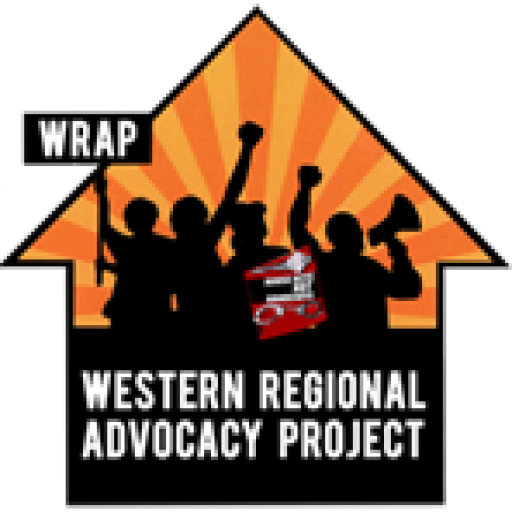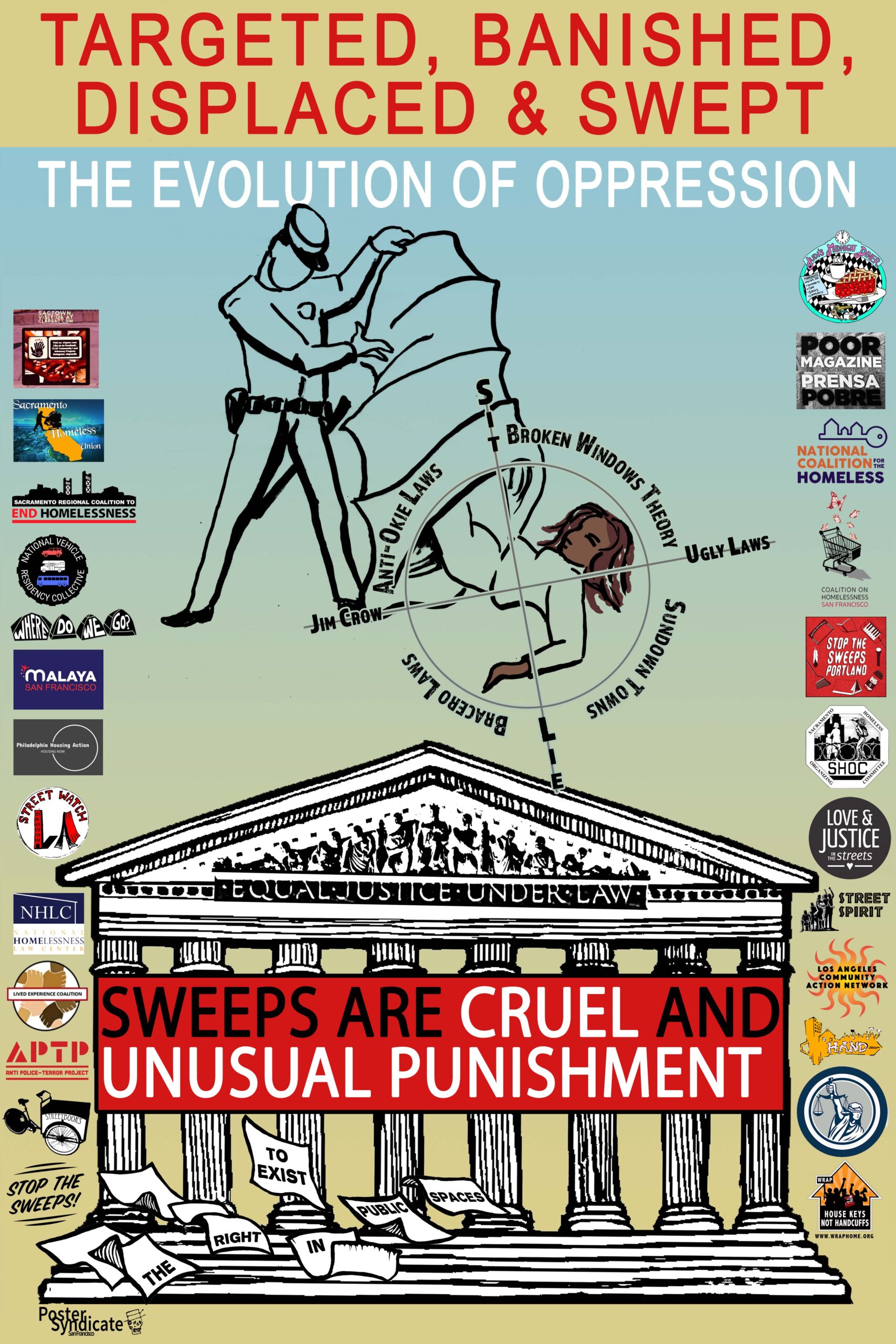Simultaneous Days of Actions
#sweepthecourt
Local Flyers of Events/ Eventos Locales
Will the US Supreme Court Make it Easier for Cities to Banish Us? Maybe. But We Will Not Disappear!

On April 22, 2024 the U.S. Supreme Court will hear the case of City of Grants Pass, Oregon v. Gloria Johnson. The case determines if the U.S. Constitution allows for local governments to fine, arrest, and jail people for living outside, when they have nowhere else to go. Western Regional Advocacy Project (WRAP) members are planning a day of action on April 22, 2024 to speak out for the rights of unhoused people to exist, in fourteen cities and counting!
The Case: The 9th Circuit Court of Appeals, which governs 9 states in the western US including Oregon, has ruled that criminalizing basic survival amounts to cruel and unusual punishment. But Grants Pass is challenging that ruling. Grants Pass officials have explicitly stated their goal is to make the city “uncomfortable enough for [unhoused people]” that they decide to “move on down the road.”
¿Facilitará la Corte Suprema de Estados Unidos que las ciudades legalizen las redadas? Quizás. ¡Pero no desapareceremos!Your Attractive Heading

El 22 de abril de 2024, la corte suprema de los Estados Unidos dará audiencia al caso de City of Grants Pass, Oregon v. Gloria Johnson. El caso determina si la Constitución de losEstados Unidos permita que los gobiernos locales multen, detengan, y encarcelen a la gente para vivir en la calle, cuando no tiene adonde ir. Miembros de Western Regional Advocacy Project(WRAP) están planificando un día de acción el 22 de abril de 2024, para defender los derechos de personas sin techo de existir, ¡en catorce ciudades – y contando!
El caso: El tribunal de apelaciones del noveno circuito, que goberna 9 estados en la parte oeste de los Estados Unidos incluyendo Oregon, ha dictaminado que la criminalización de la supervivencia básica equivale un castigo cruel e inusual. Pero Grants Pass está impugnando el fallo. Oficiales de Grants Pass han declarado explícitamente que su meta es hacer que la ciudad sea “suficientemente incómoda para [personas sin hogar]” que deciden “seguir en el camino”.
What are sweeps?
- The forced displacement of homeless communities and removal of homeless individuals from an area.
- The threat of force, arrest, citation, and/or destruction of property to coerce homeless communities to disband.
- The theft or destruction of property, including vehicles.
- Or any combination of the above
Under the guise of working for the public good, city politicians are quick to jump on criminalizing everything they possible can. This means criminalizing people for camping when they have nowhere else to protect themselves from the elements. It also means criminalizing people possessing “camping paraphernalia” with the intent to use.
Under the guise of public health, cities and police departments are sweeping encampments and displacing people from the place where they live and the community they live with. Often these sweeps involve confiscation of people’s property claiming that it is “garbage.” Other strategies include closing public restrooms, turning off public water sources and denying people the right to wash themselves or their things. More restrictions on how many belongings homeless people can have include limiting belongings to two square feet or making it illegal to store property in public space.
How did we get here?
Martin v. City of Boise
The case challenged two city ordinances. The first, Boise City Code § 9-10-02 (the “Camping Ordinance”), made it a misdemeanor to use “any of the streets, sidewalks, parks, or public places as a camping place at any time.” The second, Boise City Code § 6-01-05 (the “Disorderly Conduct Ordinance”), banned “[o]ccupying, lodging, or sleeping in any building, structure, or public place, whether public or private … without the permission of the owner or person entitled to possession or in control thereof”.
City of Grants Pass v. Johnson
Case 1:18-cv-01823-CL involves a certified class of homeless individuals residing in and around Grants Pass, Oregon. The class members allege that the City of Grants Pass has a web of ordinances, customs, and practices that, in combination, punish people based on their status of being involuntarily homeless1. The case was brought by Debra Blake, Gloria Johnson, and John Logan, on behalf of themselves and others similarly situated.
The case highlights the balance between respecting the dignity of homeless individuals and a city’s ability to protect the safety and welfare of its citizens.
Supreme Court Lets Stand 9th Circuit Ruling Finding Camping Ban Unconstitutional
The Supreme Court of the United States ruled that they will not review the Ninth Circuit case, Martin v. City of Boise, 902 F.3d 1031 (9th Cir. 2018), thus upholding their ruling that it is cruel and unconstitutional to punish unhoused people for resting in public when they are involuntarily in public space.
The ruling makes clear that to determine involuntary presence in public space, courts must not look merely to whether housing or temporary shelter beds are empty, but to whether they are accessible. Access to adequate shelter means that a person has actual access to shelter that meets the person’s needs, taking into consideration disability, religious belief, and other individual factors.
Ninth Circuit Upholds & Clarifies Homeless Persons’ Right to Survive in Absence of Housing
Court Reiterates Martin v. Boise Holding that Civil and Criminal Punishments for Homelessness are Cruel & Unusual
The U.S. Ninth Circuit Court of Appeals issued an opinion in Johnson v. City of Grants Pass (formerly Blake v. City of Grants Pass), affirming in large part a 2020 ruling from the District of Oregon and reiterating the framework from the Ninth Circuit’s decision in Martin v. City of Boise that prohibits criminalization of the basic, life-sustaining activities of people experiencing homelessness who have no alternative housing or shelter.
Despite having no shelter in town, Grants Pass engaged in a deliberate campaign to pass and heavily enforce specific ordinances targeting the life-sustaining conduct of people experiencing homelessness, with the City Council President openly stating, “the point is to make it uncomfortable enough for them in our city so they will want to move on down the road.”
SCOTUS takes up Johnson v. Grants Pass, the most significant case about homelessness in 40+ years
the Supreme Court of the United States announced that they would hear the case of Johnson v. Grants Pass on April 22 2024. This sets the stage for the most significant Supreme Court case about the rights of homeless people in decades. At its core, this case will decide whether cities are allowed to punish people for things like sleeping outside with a pillow or blanket, even when there are no safe shelter options.
WRAP’s Amicus Brief to Supreme Court

Will the US Supreme Court Make it Easier for Cities to Banish Us? Maybe. But We Will Not Disappear!
On April 22, 2024 the U.S. Supreme Court will hear the case of City of Grants Pass, Oregon v. Gloria Johnson. The case determines if the U.S. Constitution allows for local governments to fine, arrest, and jail people for living outside, when they have nowhere else to go. Western Regional Advocacy Project (WRAP) members are planning… Read more
WRAP’s Amicus Fact Sheet
On April 22, 2024 the US Supreme Court will decide if a Grants Pass, Oregon law banning camping is “cruel and unusual”, violating the 8th Amendment. Join our day of action in 14 cities across the US to let the court know that sleeping is a human right!
What Is Grants Pass Outlawing, and Why Does it Matter?
The City of Grants Pass defines camping as sleeping with a blanket or other covering. If the court sides with Grants Pass, it will give US cities the green light to further criminalize basic survival activities: sleeping, sitting, standing, eating, and more.
“Amicus Curiae” Hoja informativa WRAP
El 22 de abril de 2024, la Corte Suprema de los Estados Unidos decidirá si una ley de Grants Pass, Oregón, que prohíbe acampar es “cruel e inusual”, violando la 8ª Enmienda. ¡Únase a nuestro día de acción en 14 ciudades del pais para que la corte sepa que dormir es un derecho humano!
¿Qué es la prohibición de la cuidad de Grants Pass y por qué es importante?
La cuidad de Grants Pass define acampar como dormir con una manta u otra cubierta. Si el tribunal se pone del lado de Grants Pass, dará luz verde a las ciudades estadounidenses para criminalizar aún más las actividades básicas de supervivencia: dormir, sentarse, estar de pie, comer y más.
Zine | Will the US Supreme Court Make it Easier for Cities to Banish Us? Maybe. But We Will Not Disappear!
Events
San Francisco – TARGETED, BANISHED, DISPLACED & SWEPT. THE EVOLUTION OF OPPRESSION
Gather at Federal Building 450 on Golden Gate Ave. San Francisco
April 22 10-1pm Rally & March!
For more information:
Joemae – wrap@wraphome.org
Lukas – lilla@cohsf.org
San Francisco – Perseguidos, Desterrados, Desplazados & barridos La evolucion de la opresion

Nos vemos en el Edificio Federal 450 Golden Gate Ave. San Francisco
April 22 10-1pm
para mas informacion:
Miguel Carrera 415 346 3740 ext.319 wrap@wraphome.org
Denver, CO. Survival Ban’s are on trial at the Supreme Court – No More Criminalization of Poverty!! We will be heard!@#
Monday April 22nd 2:30-4pm Starting at the State Capitol (200 e Colfax) and ending at City Hall (1437 Bannock)
for more info: info@housekeysactionnetwork.com
Las prohibiciones de supervivencia están siendo juzgadas en la Corte Suprema – No más criminalización de la pobreza!! ¡Seremos escuchados!@# Acciones a nivel nacional!!

Lunes April 22nd 2:30-4pm Comenzando en el State Capitol (200 e Colfax) y terminando en City Hall (1437 Bannock)
para mas informacion: info@housekeysactionnetwork.com
Portland, OR. Stop the Sweeps!
Washington, D.C. The Johnson v. Grants Pass Rally
On April 22nd 2024, the Supreme Court of the United States will hear the case of Johnson v. Grants Pass. This sets the stage for the most significant Supreme Court case about homelessness in decades. At its core, this case will decide whether cities can arrest and fine people for things like sleeping outside with a pillow or blanket, even when there are no safe shelter options.
Like, Comment & Fallows on Social Media
Use the details to the right to get ahold of us.
Want to join us Contact Us:
WRAP Office
415 621 2533 office
2940 16th Street
San Francisco, CA. 94103
Via Email
wrap@wraphome.org






























